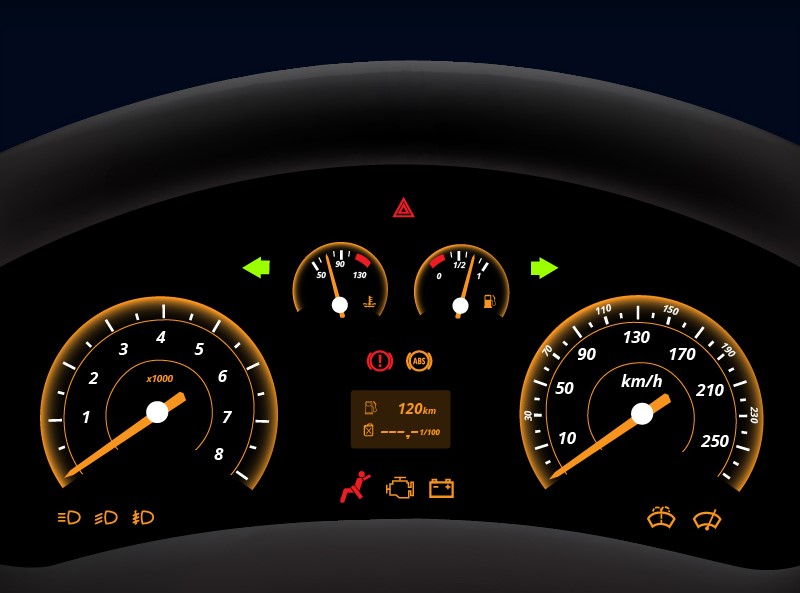The ABS (Antilock Braking System) warning light is an important safety feature in modern vehicles. It serves as an indicator that there may be an issue with the ABS system, which is responsible for preventing wheel lock-up during braking and maintaining steering control in emergency braking situations. In this article, we will explore the importance of ABS, common causes of ABS warning light activation, and the role of ABS in enhancing vehicle safety.
Understanding the ABS System: The Antilock Braking System (ABS) is a sophisticated braking system designed to prevent wheel lock-up during braking. It achieves this by rapidly modulating the brake pressure to each wheel independently, allowing the driver to maintain steering control while braking hard or on slippery surfaces. The ABS system continuously monitors the rotational speed of each wheel and adjusts the braking force accordingly to prevent skidding and maintain traction.
The Importance of ABS: The ABS system plays a crucial role in enhancing vehicle safety. Here are a few key benefits of ABS:
- Maintain Steering Control: By preventing wheel lock-up, ABS allows the driver to maintain control and steer the vehicle even during hard braking. This is particularly important in emergency situations where sudden stops are required.
- Reduce Stopping Distances: ABS helps to reduce stopping distances by allowing the driver to apply maximum braking force without the risk of wheel lock-up. This improves overall braking performance and reduces the likelihood of collisions.
- Enhance Stability on Slippery Surfaces: On slippery surfaces such as wet or icy roads, ABS prevents the wheels from locking up, ensuring that the tires maintain traction with the road. This enhances stability and reduces the risk of skidding or losing control.
Causes of ABS Warning Light Activation:
- Faulty Wheel Speed Sensors: The ABS system relies on wheel speed sensors to monitor the rotational speed of each wheel. If one or more sensors fail or become damaged, it can trigger the ABS warning light.
- Damaged or Loose Wiring: Electrical issues such as damaged or loose wiring connections can disrupt the communication between the ABS system and the vehicle’s control module, leading to the activation of the ABS warning light.
- ABS Pump or Control Module Failure: The ABS pump and control module are vital components of the ABS system. If they malfunction or fail, it can result in the ABS warning light illuminating.
- Low Brake Fluid Level: In some vehicles, a low brake fluid level can trigger the ABS warning light. This can occur if there is a leak in the braking system or if the brake pads have worn down excessively.
- Other Brake System Issues: Certain problems with the overall brake system, such as a faulty master cylinder or a brake fluid leak, can also cause the ABS warning light to activate.
Addressing ABS Warning Light Issues: If the ABS warning light illuminates, it is essential to address the issue promptly to ensure the proper functioning of the ABS system. Here are the steps you can take:
- Check Brake Fluid Level: Start by checking the brake fluid level. If it is low, inspect the brake system for leaks and have any necessary repairs made. Ensure that the brake fluid is at the recommended level.
- Inspect Wheel Speed Sensors: Inspect the wheel speed sensors and their wiring connections for any signs of damage or corrosion. Clean or replace the sensors as necessary and ensure the connections are secure.
- Perform a Battery Reset: In some cases, a simple battery reset can resolve temporary electrical glitches. Disconnect the negative terminal of the battery for a few minutes, then reconnect it. This action resets the vehicle’s electrical systems, including the ABS module.
- Seek Professional Assistance: If the ABS warning light persists or if you are unsure about the cause of the issue, it is recommended to seek professional help. A qualified mechanic can diagnose the problem using specialized diagnostic tools and perform the necessary repairs.
The ABS warning light is a crucial indicator that should not be ignored. The ABS system plays a vital role in enhancing vehicle safety by preventing wheel lock-up and maintaining steering control during braking. Understanding the causes of ABS warning light activation and taking appropriate steps to address the issue ensures the proper functioning of the ABS system and promotes safer driving. Regular maintenance and periodic inspections of the ABS system can help prevent potential problems and ensure optimal performance when it comes to braking and vehicle control.











